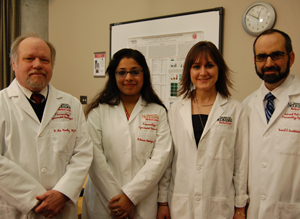 |
From left: R. Lee Mosley, Ph.D., Rebecca Banerjee, Ph.D., Ashley Reynolds and Howard Gendelman, M.D., are part of UNMC team that recently published breakthrough information about treatment for Parkinson’s disease. |
The findings target the cause of the disease and are important in developing therapies to combat nerve cell loss. Parkinson’s disease results from nerve cell death in specific areas of the brain resulting in substantive reductions in dopamine.
The dopamine losses result in tremors, slow movement, rigidity and difficulties in movement. The cause of PD is not known but mutations in a brain protein called alpha-synuclein exist in families with the genetically linked disease.
Alpha-synuclein normally aids brain function by helping cells communicate with one another. In PD, the normal function of alpha synuclein is changed as a result of local inflammatory responses when the protein is modified.
In a series of back-to-back studies, researchers at UNMC found that modified alpha-synuclein not only weakens its support function, but most importantly, mobilizes the body’s own immune defense mechanisms to destroy itself and to accelerate disease. In so doing, the protein turns itself into a conductor of accelerated neurodegenerative responses.
These findings appear in four journals — the Journal of Neurochemistry, the Journal of Neuroimmune Pharmacology, the Public Library of Science and the Proceedings of the National Academy of Sciences USA.
Even more important, the results raise new insights in regards to vaccine strategies to treat the disease. The discoveries were made possible by the work of two graduate students, Ashley Reynolds and Eric Benner, Ph.D., and postdoctoral fellow, Rebecca Banerjee, Ph.D., working in the laboratory of Howard Gendelman, M.D., chairman of pharmacology and experimental neuroscience and director of the Center for Neurovirology and Neurodegenerative Disorders at UNMC.
“Many scientists had previously thought that alpha-synuclein engagement of the immune system would inhibit Parkinson’s disease progression because the antibodies produced against the protein would serve to break down the insoluble proteins formed when alpha-synuclein becomes modified,” Dr. Gendelman said. “But this same protein also increases immune reactions that prove toxic to the brain and in so doing speed the disease.”
Normally alpha-synuclein, like many other proteins, is continually recycled within neurons. When a person is suffering from Parkinson’s, alpha-synuclein proteins accumulate in specific nerve cells associated with motor function, and form what are called Lewy bodies.
Inside these Lewy bodies are a modified form of alpha-synuclein. Nerves cell die and release the protein causing the engagement of both arms of the immune system.
Simultaneously, other brain cells called microglia become activated and digest the dead neurons and debris, including the Lewy bodies and nitrated alpha-synuclein.
Under normal conditions, microglia return to a resting state, but in PD, for reasons unknown, activated microglia don’t stop.
They continue to take up the proteins and at the same time release more nitrated alpha-synuclein.
“Our research presents conclusive evidence through these four studies in mice and using human autopsy tissue that nitrated alpha-synuclein induces toxic inflammatory effects, which are detrimental to healthy neurons. It also incites elements of the immune system in and outside the brain,” said R. Lee Mosley, Ph.D., co-investigator for these studies and an assistant professor of pharmacology and experimental neuroscience at UNMC.
The research also involved collaborations with the laboratories of Kalipada Pahan, Ph.D., of Rush Medical School in Chicago, and Serge Przedborski, Ph.D., of Columbia University Medical Center in New York.
What others are saying:
“Parkinson’s disease remains an essentially untreatable disease. Significant progress has been made in applying dopamine replacements, but we currently have no treatments to definitively slow progression or reverse the progressive course. This work contributes very significantly to our understanding of Parkinson’s disease, and potentially other neurodegenerative diseases, by highlighting the avenues of research this may allow for rational therapeutic targets to be developed by focusing on these adaptive immune responses that appear to exacerbate Parkinson’s.”
Justin McArthur, M.D., interim director of the department of neurology at Johns Hopkins University
“Dr. Howard Gendelman is a world authority and expert in neurosciences. In this new work, he finds that cell responses made against a modified oxidized version of alpha-synuclein promotes cell death in the brains of rodents. This work is of importance for two reasons — first it suggests that in patients with Parkinson’s disease, formation of this abnormal synuclein could lead to the production of T cells that will worsen the disease. The second point is that when developing immunotherapies for Parkinson’s using antibodies it is important to consider avoid using antibodies against this abnormal form of synuclein. This opens the possibility for a new mechanism in the pathogenesis of disease.”
Eliezer Masliah, M.D., professor of neurosciences and pathology, University of California, San Diego School of Medicine
“Dr. Gendelman’s latest research in Public Library of Science One represents a unique inroad into advancing our understanding of the interplay between neurons degenerating from a synucleinopathy and immune effector cells in Parkinson’s disease. This work is a paradigm shift for Parkinson’s disease researchers because it lays the groundwork for immunomodulatory therapies designed to prevent this type of aberrant signaling between dopaminergic neurons and lymphoid cells.”
Harris Gelbard, M.D., professor and interim director of the Center for Neural Development and Disease at the University of Rochester Medical Center